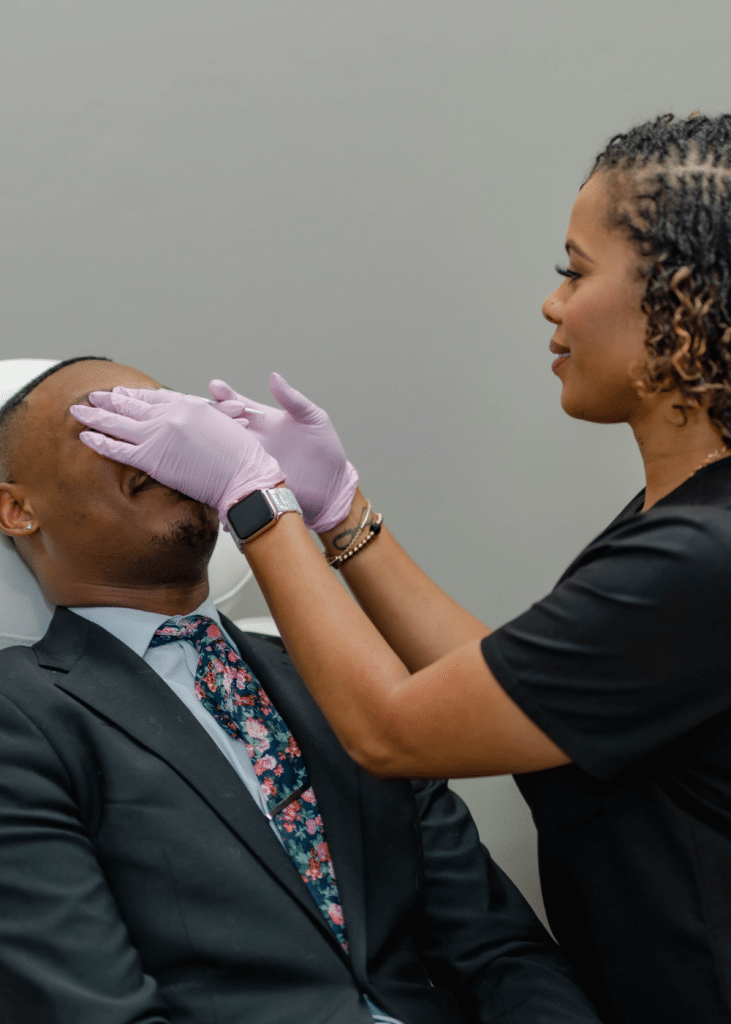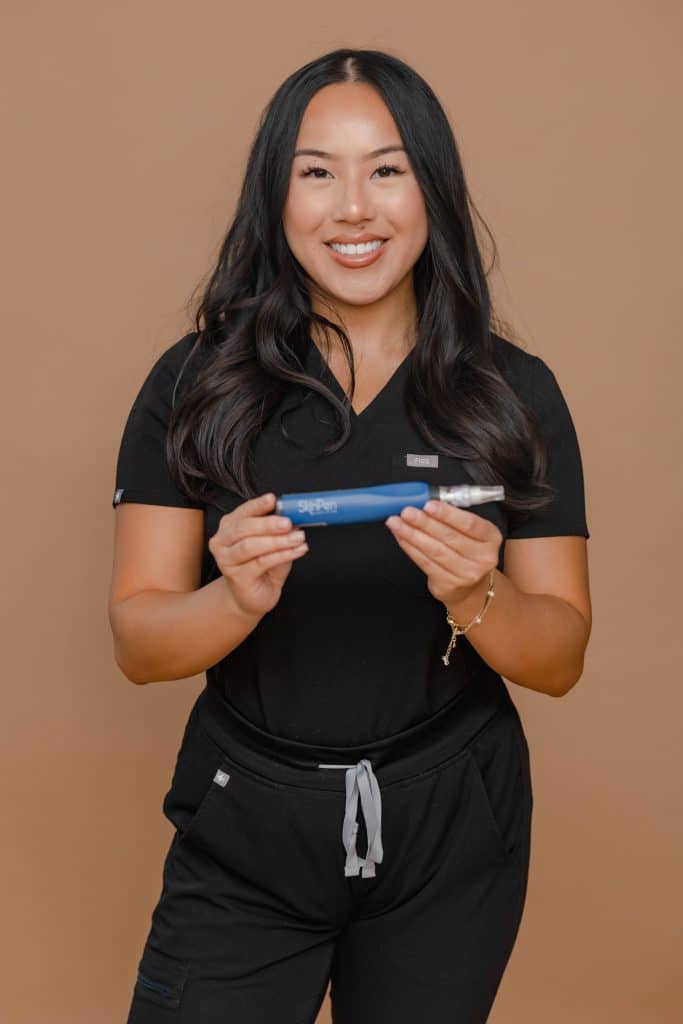
Platelet Rich Plasma or PRP therapy is a modern non-surgical technology that has many uses in both skin and healthcare. PRP procedures are non-invasive and 100% safe, as they use your body’s own blood to improve your health and looks. PRP therapy was first used as a way to treat sports injuries and aid in post-op recovery. However, due to the therapy’s effectiveness, it has since been adapted as a beauty treatment. In the skincare industry, PRP treatments for the face have also been marketed as “Vampire Facials®”.
PLEASE NOTE: This page is meant as general information on Platelet-rich Plasma as in various treatment types so that you can be informed as to the versatility that the healthcare industry has found in PRP’s amazing healing qualities.
However, this page does not represent the PRP treatment types offered by Belle Âme Med Spa. Currently, we offer PRP in conjunction with SkinPen facials.
PRP Overview:
- Extremely versatile and powerful skin rejuvenation technology
- Highly effective anti-aging results
- Can be used in areas that other treatments can not
- Patients report visible results as lasting up to a year
How Does PRP Therapy Work?
First, a small amount of blood is obtained from the patient and is then placed in a centrifuge. By spinning at a very high speed, the centrifuge divides the platelets from the rest of the blood’s components.
Platelets, also known as thrombocytes, are natural components of the blood. Their main job in our body is to help form blood clots that stop the bleeding when we suffer an injury.

In addition to that, however, platelets also release a potent chemical agent called platelet-derived growth factor. It is known to aid wound healing, the repair of damaged tissue, and overall cellular growth.
The separated platelets are then mixed with hyaluronic acid fillers, and the resulting mixture is injected into the treated skin areas.
Once injected, the growth factor in the platelets stimulates increased collagen production in the skin. That, in turn, results in improved volume, elasticity, and texture, and minimizes the appearance of wrinkles and fine lines. Overall, the skin is firmer, stronger, and more youthful.
What Conditions Can PRP Therapy Help With?
PRP therapy can help with a host of skin and other health issues, as well as enhance and supplement other treatment types. These include:
Improving the Look of Dull Skin
Dull skin is typically the result of build-up of dead skin cells on the skin’s outermost visible layer. That causes the skin to dry out and lose its natural glow.
Fortunately, this condition is easily addressed by physically getting rid of the layer of dead skin cells. That also boosts cell renewal and regrowth, resulting in a healthier and more radiant complexion. One way to achieve that is through PRP therapy.
Boosting Collagen Production
Our skin is mostly made up of collagen, a structural protein found all over our bodies and in our bones, teeth, tendons, and cartilage. As our bodies age, they produce less and less collagen. That causes our skin to slowly lose its volume, firmness, and once-youthful look.
PRP therapy can help stimulate collagen production in the skin. As a result, the skin becomes smoother, tighter, and more elastic.
Reversing Skin Aging
PRP treatments can also help slow down or even reverse the skin’s aging process. By stimulating the production of collagen and elastin, PRP therapy reduces the appearance of age spots, sagging skin, wrinkles, and fine lines, leaving you with a healthier and fresher complexion.
Treating Sun Damage
Repeated and even one-off sun damage can result in dry, flaky, and more sensitive skin. Over time, sun exposure can cause brown spots, freckles, hyperpigmentation, wrinkles, fine lines, and overall skin aging. PRP therapy can successfully treat the symptoms of sun damage and help restore the skin to a normal and healthy state.
Scars
PRP is a great and highly effective therapy that minimizes the appearance of all types of scarring, depressed, or raised skin. Scars that can benefit from PRP treatment include post-surgical scars as well as scars from acne, chickenpox, and various kinds of injuries.
By improving the texture and evening out the color of your skin, PRP treatment can make scars and any imperfections barely visible.
Stretch Marks
Stretch marks are a form of scarring that results from the rapid expansion and contraction of the skin. That, in turn, causes its outermost layer to stretch and eventually tear, leaving your skin with a fresh stretch mark. Common factors for stretch marks include yo-yo dieting, pregnancy, muscle building, surgical implants, or simply fast growth during the teen years.
Stretch marks may shrink or fade over time, but they never fully go away on their own. What’s more, they can also leave deep grooves in the surface of the skin.
Luckily, modern PRP therapy can nearly fully minimize the appearance of stretch marks by triggering the body’s natural healing and skin regeneration powers.
Skin Repair After Pregnancy and Childbirth
Both pregnancy and childbirth take a toll on women’s bodies and their skin in particular. Many women find that their postpartum skin has decreased firmness, elasticity, volume, and tone. Stretch marks are also a common side effect.
As PRP therapy can greatly improve the overall health and look of the skin, it is an excellent and highly effective treatment for any pregnancy and postpartum skin conditions.
Hair Restoration
Hair restoration treatments help regrow lost hair in patients with severe hair loss. These treatments typically involve either stimulating the scalp to encourage hair growth or replacing compromised hair follicles with healthy ones from another area of the scalp or body. PRP therapy can supplement and enhance standard hair restoration treatments through its powerful growth factor action.
Helping Treat Alopecia
Alopecia, more commonly known as hair loss or balding, is characterized by severe hair loss on the head and/or elsewhere on the body. PRP therapy can help effectively alleviate the symptoms of alopecia.
Sports Injuries and Other Acute Injuries
Many pro athletes, including Tiger Woods and Hines Ward, use PRP therapy to speed up their recovery time. PRP procedures can effectively treat a wide range of sports-related and other soft tissue injuries that lead to joint, tendon, or ligament pain. Some conditions that seem to respond well to PRP therapy include:
- Tendonitis
- Inflammatory Joint Pain
- Ligament and Muscle Injuries
- Chronic Degenerative Joint Disease
- Early Partial Tendon Tears
Most of these conditions are slow to heal due to the poor blood supply to these body regions. The injection of concentrated PRP solution into the target area stimulates healing and cell regeneration, therefore helping the body heal itself.
Side Effects
As PRP therapy essentially involves injecting the patient’s own platelets back into their bloodstream, most people do not usually report any side effects. Some mild adverse reactions include bleeding, pain, and irritation of the treated area. Other, more serious but rare, side effects include nausea, dizziness, and passing out. Overall, however, you should have nothing to worry about.
